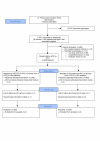Effectiveness of PRECEDE model for health education on changes and level of control of HbA1c, blood pressure, lipids, and body mass index in patients with type 2 diabetes mellitus
- PMID: 21524316
- PMCID: PMC3098792
- DOI: 10.1186/1471-2458-11-267
Effectiveness of PRECEDE model for health education on changes and level of control of HbA1c, blood pressure, lipids, and body mass index in patients with type 2 diabetes mellitus
Abstract
Background: Individual health education is considered to be essential in the overall care of patients with type 2 diabetes (DM2), although there is some uncertainty regarding its metabolic control benefits. There have been very few randomized studies on the effects of individual education on normal care in DM2 patients with a control group, and none of these have assessed the long-term results. Therefore, this study aims to use this design to assess the effectiveness of the PRECEDE (Predisposing, Reinforcing, Enabling, Causes in Educational Diagnosis, and Evaluation) education model in the metabolic control and the reduction of cardiovascular risk factors, in patients with type 2 diabetes.
Methods: An open community effectiveness study was carried out in 8 urban community health centers in the North-East Madrid Urban Area (Spain). Six hundred patients with DM2 were randomized in two groups: PRECEDE or conventional model for health promotion education. The main outcome measures were glycated hemoglobin A1c, body mass index (BMI), blood pressure, lipids and control criteria during the 2-year follow-up period.
Results: Glycated hemoglobin A1c and systolic blood pressure (SBP) levels decreased significantly in the PRECEDE group (multivariate analysis of covariance, with baseline glycated hemoglobin A1c, SBP, and variables showing statistically significant differences between groups at baseline visits). The decrease levels in diastolic blood pressure (DBP), triglycerides and LDL cholesterol were nonsignificant. PRECEDE increased compliance in all control criteria, except for LDL cholesterol. BMI did not change during the study in either of the two models analyzed.
Conclusions: PRECEDE health education model is a useful method in the overall treatment in patients with type 2 diabetes, which contributes to decrease glycated hemoglobin A1c and SBP levels and increase the compliance in all the control criteria, except for LDL cholesterol.
Trial registration number: ClinicalTrials.gov NCT01316367.
Figures
References
Publication types
MeSH terms
Substances
Associated data
LinkOut - more resources
Full Text Sources
Medical



